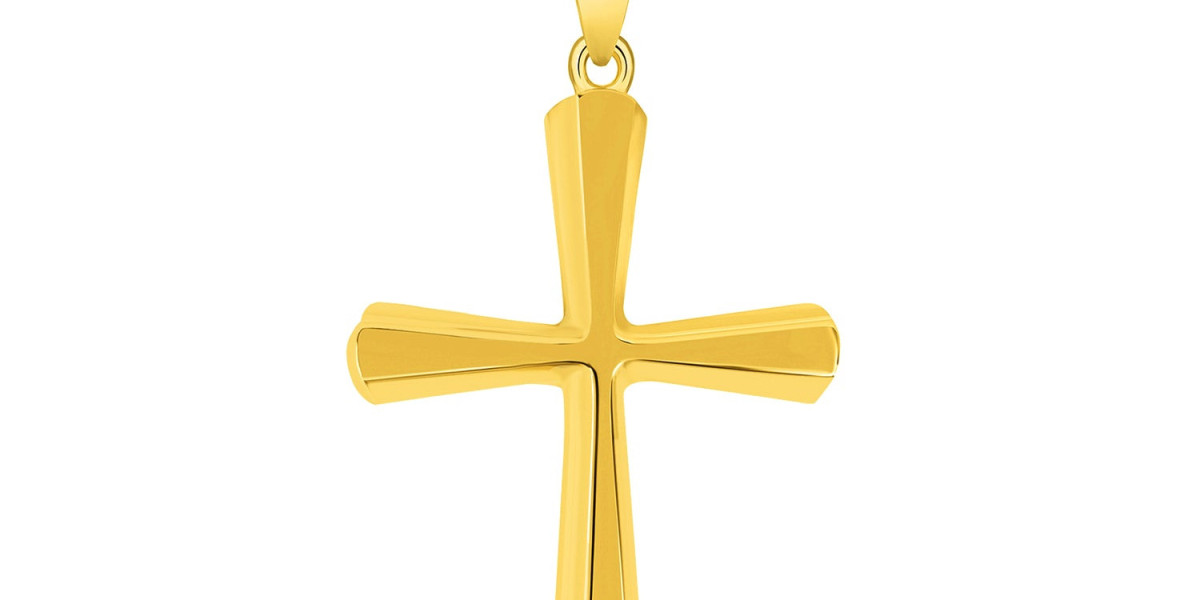Cross pendant necklaces are more than just stylish accessories; they hold deep cultural and religious significance for many people around the world. These pieces of jewelry are powerful symbols of faith, identity, heritage, and personal beliefs. In this blog, we will delve into the cultural and religious significance of cross pendant necklace, exploring their historical roots, symbolic meanings, and contemporary relevance.
The cross symbol's historical origins
The cross is one of humanity's oldest symbols, dating back to pre-Christian times and found in various ancient civilizations. In ancient Egypt, the ankh—a cross with a loop at the top—symbolized life and immortality. Similarly, different religious and ritualistic contexts used cross-like symbols in Mesopotamian and ancient Greek cultures.
With the advent of Christianity, the cross took on a new, profound meaning. It became a symbol of the crucifixion of Jesus Christ and his subsequent resurrection, embodying themes of sacrifice, redemption, and eternal life. Early Christians used the cross covertly to identify themselves during periods of persecution. Over time, it evolved into the central emblem of Christian faith, prominently featured in religious art, architecture, and jewelry.
The Cross in Christian Theology
In Christian theology, the cross is central to the belief in Jesus Christ's sacrificial death and resurrection. It represents the ultimate act of love and redemption, where Jesus offered himself for the sins of humanity. This profound symbolism makes the cross a powerful reminder of the promise of salvation and eternal life for believers.
The cross is also a symbol of faith and devotion. Wearing a cross pendant necklace serves as a personal expression of one's commitment to Christian beliefs. It is a tangible reminder of the spiritual journey and the central tenets of the Christian faith, often providing comfort and strength in times of adversity.
Cross Pendants in Religious Practices
Cross pendants are integral to various religious practices and ceremonies within Christianity. They are often given as gifts during significant life events such as baptisms, confirmations, and first communions. These occasions mark important milestones in a Christian's spiritual journey, and the cross pendant serves as a cherished keepsake that symbolizes their faith.
In addition to personal milestones, cross pendants are worn during religious observances and worship services. They are seen as a way to honor and connect with the divine, providing a sense of protection and guidance. The act of wearing a cross pendant can be a daily devotional practice, reinforcing one's faith and commitment.
Cultural Variations in Cross Designs
Cross designs vary significantly across different cultures and regions, each reflecting local traditions and artistic influences. For example, the Celtic cross, characterized by a circle around the intersection, is prominent in Irish culture and symbolizes the fusion of pagan and Christian beliefs. The Greek cross, with arms of equal length, is common in Eastern Orthodox Christianity.
These cultural variations highlight the adaptability of the cross symbol and its universal appeal. Each design carries unique meanings and significance, allowing individuals to choose a cross pendant that resonates with their cultural heritage and personal beliefs. This diversity enriches the symbolism of the cross and its role in global religious and cultural traditions.
The Cross in Modern Fashion
In modern fashion, cross pendant necklaces have transcended their religious origins to become popular accessories. Celebrities and fashion influencers often incorporate cross pendants into their outfits, blending spirituality with style. This trend has contributed to the cross's enduring relevance and versatility in contemporary culture.
Fashion designers frequently experiment with cross designs, incorporating various materials, sizes, and embellishments. This creative freedom allows for a wide range of cross pendants, from simple and understated to bold and ornate. Despite these variations, the cross retains its fundamental symbolism, making it a meaningful and fashionable choice for many.
Cross pendants are family heirlooms.
Cross pendant necklaces often hold sentimental value as family heirlooms, passed down through generations. These pieces carry the stories and faith of ancestors, serving as a tangible link to family heritage and traditions. They are cherished not only for their religious significance but also for their emotional and historical value.
Heirloom mens gold cross necklace are often associated with family milestones and memories. They may be worn during weddings, christenings, and other significant events, symbolizing continuity and connection. As they are handed down, these pendants reinforce familial bonds and the transmission of faith and values across generations.
Cross Pendants in Art and Literature
The cross has been a prominent motif in art and literature throughout history. Paintings, sculptures, and stained glass windows depict scenes from the life of Jesus Christ in Christian art. These artistic representations emphasize the cross's significance as a symbol of faith and salvation.
Literature also reflects the cross's impact, with numerous references in religious texts, poetry, and prose. Writers often use the cross to convey themes of suffering, redemption, and divine love. These artistic and literary depictions enhance the cultural understanding of the cross and its profound influence on human expression.
Symbolism of the Cross in Different Religions
While the cross is predominantly associated with Christianity, it also holds significance in other religious traditions. In Hinduism, the swastika, a cross-like symbol, represents favorable fortune and auspiciousness. Similarly, in ancient Egyptian culture, the ankh, a cross with a loop at the top, symbolized life and immortality.
These cross-like symbols highlight the universal nature of the cross as a symbol of spirituality and transcendence. Despite the differences in religious contexts, the cross consistently represents fundamental aspects of human existence, such as life, death, and the divine, underscoring its widespread cultural and religious relevance.
The Cross in Personal Identity
For many individuals, wearing a cross pendant is a statement of personal identity and belief. It is a way to express one's faith openly and confidently. The cross serves as a visible marker of one's spiritual journey and values, often sparking conversations and connections with others who share similar beliefs.
The choice of cross pendant can also reflect personal style and preferences. Some may prefer simple, unadorned crosses, while others might choose elaborate designs with gemstones and intricate details. This personal expression through the cross pendant allows individuals to integrate their spirituality into their everyday lives.
Cross Pendants in Times of Adversity
During times of adversity and hardship, the cross pendant can provide comfort and strength. It serves as a reminder of faith and hope, offering solace in challenging moments. Many individuals turn to their cross pendant as a source of spiritual support and resilience, drawing on their beliefs to navigate difficult times.
The cross's association with sacrifice and redemption also provides a powerful symbol of endurance and triumph over suffering. Wearing a cross pendant during tough times can reinforce the belief in overcoming obstacles and finding light in the darkest moments, resonating deeply with those who seek spiritual guidance.
The Cross in Global Interfaith Dialogues
In an increasingly interconnected world, the cross often features in global interfaith dialogues. These discussions aim to promote understanding and respect among different religious traditions. The cross, as a symbol with both specific and universal meanings, serves as a bridge for exploring common values and fostering mutual respect.
Interfaith dialogues involving the cross can lead to greater awareness of shared beliefs and practices, promoting peace and cooperation among diverse communities. By acknowledging the cross's multifaceted significance, these dialogues contribute to a more inclusive and harmonious global society.
Ethical Considerations in Cross Pendant Production
The growing demand for ethical and sustainable practices in the jewelry industry extends to the production of cross pendants. Consumers are increasingly concerned about the environmental and social impact of their purchases. Ethical considerations include fair labor practices, responsible sourcing of materials, and minimizing environmental harm.
Choosing ethically produced gold cross pendant supports sustainable and fair practices in the jewelry industry. It ensures that the pendants are made in a way that respects both the environment and the workers involved in their production. This ethical commitment adds an extra layer of significance to the cross pendant, aligning spiritual values with responsible consumer choices.
Conclusion
Cross pendant necklaces carry profound cultural and religious significance, reflecting a rich tapestry of historical, theological, and personal meanings. From their ancient origins to their modern interpretations, cross pendants remain powerful symbols of faith, identity, and heritage. Understanding the diverse contexts and significance of the cross allows us to appreciate its enduring impact on human culture and spirituality.
Whether worn as an expression of personal belief, a family heirloom, or a fashionable accessory, the cross pendant necklace continues to resonate deeply with individuals around the world. Its multifaceted symbolism and timeless appeal make it a cherished and meaningful piece of jewelry, embodying the intersection of the divine and the human experience.







